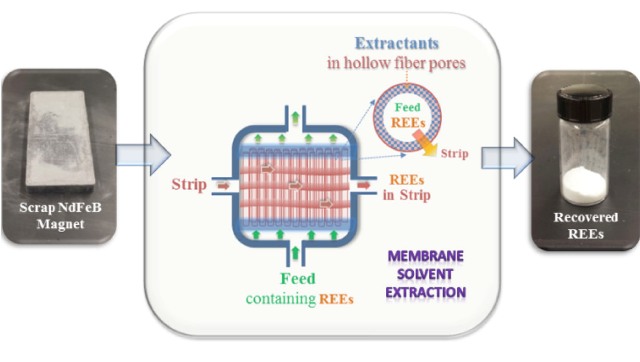Aug 12 2015
A new technology developed by the U.S. Department of Energy’s Critical Materials Institute that aids in the recycling, recovery and extraction of rare earth minerals has been licensed to U.S. Rare Earths, Inc.
 A membrane solvent extraction system developed through the Department of Energy’s Critical Materials Institute can help recover and recycle rare-earth elements found in electronic waste.
A membrane solvent extraction system developed through the Department of Energy’s Critical Materials Institute can help recover and recycle rare-earth elements found in electronic waste.
The membrane solvent extraction system, invented by CMI partners Oak Ridge and Idaho national laboratories, is the first commercially licensed technology developed through the CMI.
Established in 2013 as an Energy Innovation Hub, CMI explores ways to assure supply chains of materials critical to clean energy technologies such as wind turbines, electric vehicles, efficient lighting and advanced batteries. CMI Director Alex King credits a close collaboration with industry as key to making technology transfer happen well ahead of traditional time frames.
"Going from an idea to a licensed technology in just two years is exactly what CMI is intended to do, and we've proven we can do it," King said.
The recycling of critical materials from electronic waste has been limited by processing technologies that are inefficient, costly and environmentally hazardous. ORNL’s Ramesh Bhave, who led the membrane solvent extraction research and development, says the team’s new simplified process eliminates many of these barriers.
“Our single-step process to recover rare-earth elements from scrap magnets is more environmentally friendly and has the potential to be a more cost-effective approach compared to conventional routes such as precipitation,” Bhave said.
The technology uses a combination of hollow fiber membranes, organic solvents and neutral extractants to selectively recover rare-earth elements such as neodymium, dysprosium and praseodymium. These elements have a key function in permanent magnets used in cars, cell phones, hard disk drives, computers and electric motors.
In laboratory testing, the membrane extraction system demonstrated the potential to recover more than 90 percent of neodymium, dysprosium and praseodymium in a highly pure form from scrap neodymium-based magnets.
Through its licensing agreements with ORNL, U.S. Rare Earths intends to apply the technology to recover rare earth elements from old electronics and from its mining claims in the United States.
“Based on conversations around our mutual commitment to U.S. sustainability, we agreed that the recycling of electronic waste will provide a competitive source of neodymium, dysprosium and praseodymium for growing the clean tech sector including electric vehicles,” said Kevin Cassidy, CEO for U.S. Rare Earths, Inc.
Co-inventors of the technology are ORNL’s Ramesh Bhave and Daejin Kim and Idaho National Laboratory’s Eric Peterson.
The Critical Materials Institute is a Department of Energy Innovation Hub led by the U.S. Department of Energy's Ames Laboratory. CMI seeks ways to eliminate and reduce reliance on rare-earth metals and other materials critical to the success of clean energy technologies. CMI is supported by the Advanced Manufacturing Office in DOE’s Office of Energy Efficiency and Renewable Energy.
ORNL is managed by UT-Battelle for the Department of Energy's Office of Science.
DOE's Office of Science is the single largest supporter of basic research in the physical sciences in the United States, and is working to address some of the most pressing challenges of our time. For more information, please visit science.energy.gov.
Source: http://www.ornl.gov/